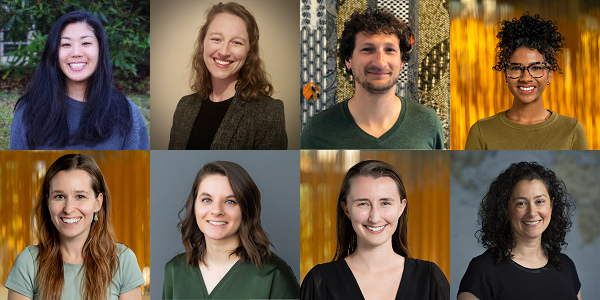March 20, 2025
Enterics for Global Health (EFGH) Coordination Team nominated for UW Distinguished Staff Award
Staff members of the Enterics for Global Health (EFGH) Coordination Team have been nominated for a University of Washington (UW) Distinguished Staff Award in recognition of their contributions to advancing equity within global health research consortium models and implementing systems and programs that support early career investigators and researchers in low- and middle-income countries (LMICs).

The team includes (pictured top row from right to left): Hannah Atlas (Research Manager), Erika Feutz (Data Manager), Sean Galagan (Senior Data Manager), Anya Lewin (Program Operations Specialist). Pictured bottom row from right to left: Chloe Morozoff (Research Assistant), Sonia Rao (Program Specialist), Olivia Schultes (Data Manager), and Alyson Shumays (Global WACh Co-Director as Program Manager).
For over three years, they have supported the Enterics For Global Health Shigella surveillance study, a seven country observational study that aims to measure the incidence of Shigella diarrhea in young children and generate evidence for future vaccine trials. Beyond the daily coordination activities and support of a rigorous and high-profile study of this size, they implemented a series of equity-focused initiatives. These initiatives include the:
- Implementation of protocol development working groups comprised of representatives from each country site and coordinating body. In these working groups, central protocol, SOPs, and data collection tools were co-developed in a way that leveraged the robust expertise within the Consortium and reflected the unique implementation settings.
- Manuscript Writing Certificate Program that matched 11 early career investigators from LMICs with a mentorship team to guide them through the process of conducting a secondary data analysis and developing, writing, and submitting a manuscript for publication. Cohort members presented their research projects in a culminating poster session at the recent annual EFGH Convening in Kenya, organized by the UW team.
- Rising Star Award Program provides seed funding to support the pursuit of a new research question that leverages EFGH data and supports awardee’s career pathways to becoming independent researchers. In March 2024, three inaugural awardees from Bangladesh, Kenya, and Peru presented their findings at a virtual talk hosted by Global WACh (watch here). Three current awardees from Malawi, Mali, and Pakistan will present their findings virtually on Thursday, April 24th at 9 AM PDT (learn more).
- Innovative design, meticulous coordination, and successful execution of a co-first and co-last authorship model that aims to distribute authorship and publication opportunities equally across the Consortium and is reflected in a sixteen-manuscript protocol supplement published in Open Forum Infectious Diseases in April 2024. Each paper was co-written by eight co-first authors and by eight co-last authors (one author and one senior mentor from each study site and coordinating body). The team is currently implementing this process for the five primary manuscripts as well.
- Strong centralized data management systems to support high quality data, leading statistical analysis planning and execution for the five primary manuscripts, providing mechanisms to support real-time data access and visualization that enable the funder and other stakeholders to make informed decisions about Shigella vaccine licensure trial design.
- Implementation of regular feedback survey to partners of all cadres to identify site-specific training and capacity building priorities (e.g. manuscript writing, data analysis, grant and administration support, etc.) to inform resource prioritization and advocacy efforts to funders.
As a result of the UW Coordination Team’s efforts, EFGH is viewed as an exemplary model of how US-based academic institutions can work in partnership with global partners to advance power sharing, cultivate meaningful collaborations, and produce high impact science. Their innovation, leadership, and effective collaboration embody the values of the Distinguished Staff Award.
Congratulations, all!